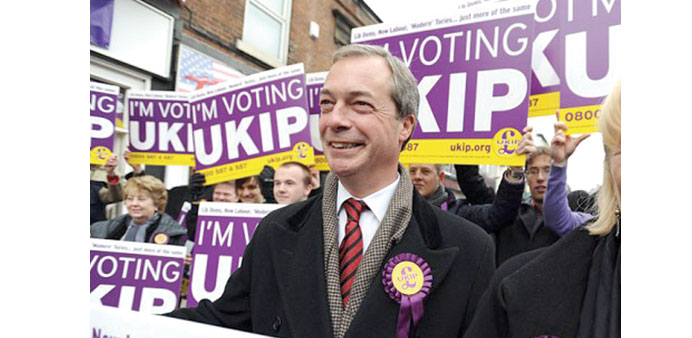DPA/London
“You’re probably thinking, there’s that Ukip chap,” parliamentary candidate Nigel Carter said amid jeers and mocking laughter from mainly left-wing voters in southern England.
“Ukip is not racist, not homophobic and not fascist,” Carter said, sidestepping a question on the environment to election candidates in the Green-held Brighton Pavilion constituency.
When Carter, a grandfather in his mid-60s, got to defining what the UK Independence Party does stand for, top of the list was its opposition to the European Union, which he calls a “nasty little operation”.
“We don’t want to be a province of the EU superstate,” Carter told DPA.
Launching Ukip’s election manifesto on Wednesday, Ukip leader Nigel Farage urged voters to help him “set free” Britain from the European Union.
“Only by leaving the EU can we control immigration,” Farage said. “We should govern our own country and make our own laws.”
Carter was inspired to join Ukip in 2009 after watching the “brilliant” Farage’s speeches on television, meeting him regularly over the next few years.
“I saw him all the time and he is a lovely bloke... just the way he listens to everybody,” he said.
Like Farage, Carter sometimes canvasses for votes in pubs and bars, including those favoured by Brighton’s large gay and lesbian community.
“I walked into a gay bar and I said, ‘Hello I’m from Ukip’,” Carter said.
“You’re brave coming here,” one of the drinkers told him, “You’re homophobic.”
Ukip canvassers in the city suffer frequent abuse and intimidation, Carter said.
“We definitely get on-the-street, on-the-ground intimidation and it’s cut back what we can do in terms of promoting ourselves, and it’s a defeat for democracy.”
Formed in 1993, the right-wing populist party has tried to shed its early association with British nationalism and xenophobia.
Carter claims it is the victim of a campaign to undermine it by the major parties, Labour and the Conservatives.
It surprised many people by winning 27% of the British vote in elections to the European Parliament last May. It took 24 seats, more than any other British party.
But that result was skewed by a turnout of just 35% of voters, meaning only 10% of eligible voters backed Ukip, said Matthew Goodwin, a political analyst at Nottingham University.
Goodwin, author of last year’s book Revolt on the Right, calls Ukip “the most significant new party in British politics for a generation.”
Support for Ukip appears to have declined slightly since the European elections but remains “broadly stable” at about 10%. It is expected to win two to four seats in next month’s parliamentary election, Goodwin said.
Its success last year prompted Conservative prime minister David Cameron to tell the BBC he understood how “people are deeply disillusioned with the EU”.
“They don’t feel the current arrangements are working well enough for Britain and they want change,” Cameron said.
Opposition Labour leader Ed Miliband also said he had changed his party’s position on immigration.
In a seven-way televised debate between party leaders this month, Miliband promised restrictions on immigrants claiming benefits and support for Britain’s minimum wage, which he said was undercut by migrant workers.
Net immigration soared by 42% to 298,000 in the year to September, the government said, meaning Cameron failed to come close to meeting a target set in 2010 to reduce annual net immigration to below 100,000.
Cameron’s election manifesto includes a promise to renegotiate the terms of Britain’s EU membership before holding an in-out referendum by 2017.
“One of the things on which we need some change in Europe is rules about immigration and about entitlement to benefits,” veteran Conservative politician William Hague told reporters on Wednesday.
Hague said Cameron wants to be able to “recommend, on the basis of a successful negotiation, that people vote to stay in the European Union.”
UKIP advocates an immediate referendum on EU membership, a five-year ban on immigration by unskilled workers, and the introduction of an Australian-style points-based system.
It blames the previous Labour government’s “open door” policy before 2010 for allowing hundreds of thousands of migrants to move to Britain without any linked programmes to expand public services and infrastructure.
The number of foreign-born residents increased by another 565,000 between 2011 and 2014, with about two-thirds of the migrants born in EU countries, according to official estimates.
In Brighton and other cities popular with migrants, the strain is felt in schools, housing, doctors’ surgeries and hospitals, Carter said.
“Essentially what they’ve done is, they’ve opened it all up and made no plans at all,” he said.

Nigel Farage
